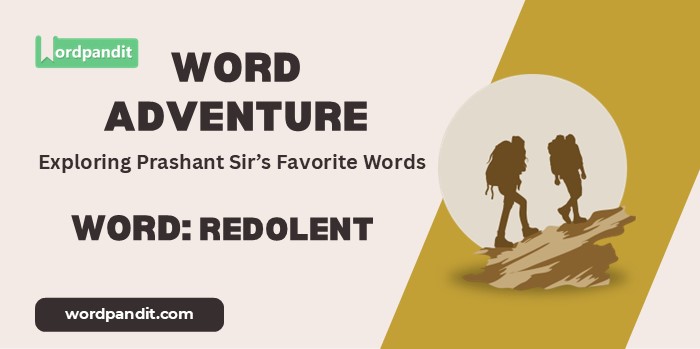Word Adventure: Redolent
The Headline
“The Perfume of Memory: How ‘Redolent’ Captures the Essence of Experience”
The Scoop
In the aromatic garden of English vocabulary, some words carry the power to evoke not just meanings, but entire sensory experiences. ‘Redolent’ is one such term – a word that began with scent but has evolved to encompass all the ways one thing can remind us of another. Let’s explore this evocative word that bridges the gap between sensation and memory.
Let’s Break It Down
The Plot Thickens
‘Redolent’ began its journey in the 14th century, originally referring specifically to the emission of a strong scent. The Latin root ‘redolere’ literally meant “to smell again” or “to give off an odor,” suggesting the persistent nature of certain aromas.
Over time, the word’s meaning expanded beyond just fragrance. Just as a scent can transport us to different times and places, ‘redolent’ came to describe anything that strongly suggests or reminds us of something else. This evolution reflects our understanding of how memory and association work – how one sensation, image, or idea can evoke another.
Today, while ‘redolent’ still maintains its connection to scent, it has become equally powerful in describing abstract connections and reminiscences that stir our memories and emotions.
Word in the Wild
The Twist
Here’s an intriguing aspect of ‘redolent’: while we often think of it in positive terms – pleasant scents and happy memories – it can also describe less appealing associations. A politician’s speech might be redolent of past scandals, or an excuse redolent of previous deceptions. This duality reminds us that our power of association works in all emotional directions!
Make It Stick
Redolent: When something’s playing memory games with your nose and mind!
Your Turn
Think about the scents that are most redolent of significant moments in your life. What smells transport you instantly to specific times, places, or emotions? Share your aromatic memories in the comments below. Let’s explore how these sensory connections shape our personal narratives!
Down the Rabbit Hole
- Curious about the science of smell and memory? Explore the connection between the olfactory system and the limbic system.
- Interested in the art of perfumery? Research how master perfumers create scents that evoke specific memories and emotions.
- Want to discover more words about memory and association? Look into terms like ‘evocative’, ‘reminiscent’, and ‘mnemonic’.
The Last Word
As we conclude our exploration of ‘redolent’, I hope you’ve gained appreciation for this word that captures the power of sensory and emotional association. It reminds us that our experiences are deeply interconnected, with each moment potentially echoing others through scent, memory, or suggestion. The next time something triggers a cascade of associations in your mind, remember – you’re not just remembering, you’re experiencing the redolent nature of consciousness! Until our next word adventure, this is Prashant from Wordpandit, encouraging you to savor the rich aromatics of language!












